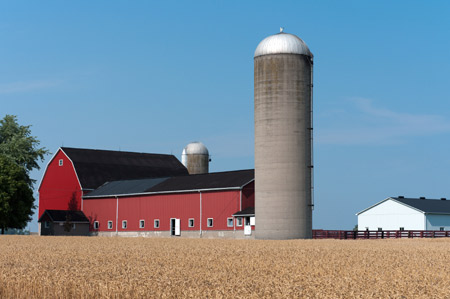Congress just let the farm bill expire. It’s not the end of the world … yet.
Category: Policy
 (Washington Post) – The current Congress has been spectacularly adept at not doing stuff. They’ve passed fewer bills than any other Congress in the past 50 years. They can’t get appropriations bills finished on time. They nearly let the highway bill expire. So it’s hardly a stunner that, this weekend, the 112th Congress managed to let the farm bill lapse as well.
(Washington Post) – The current Congress has been spectacularly adept at not doing stuff. They’ve passed fewer bills than any other Congress in the past 50 years. They can’t get appropriations bills finished on time. They nearly let the highway bill expire. So it’s hardly a stunner that, this weekend, the 112th Congress managed to let the farm bill lapse as well.
Don’t panic! Yet …
Yes, the farm bill. Back in 2008, Congress passed a five-year bill that funded a whole array of agricultural programs, from food stamps to farm subsidies to conservation programs. This year was the year to renew and the Senate passed its own 10-year, $969 billion farm bill in June (here’s our breakdown). The House, however, hasn’t yet cobbled together its version yet. There were too many disagreements among Republicans over whether and how to cut $16 billion in food-stamp and nutrition funding over the next five years. So, John Boehner explained, they’ll have to finish work in the lame-duck period after the elections.
But what about the interim period? Is it a disaster that the country now has no farm bill? Not necessarily. Or at least not yet. The folks at the National Sustainable Agriculture Coalition (NSAC) have written up a handy primer on what happens next. Here’s our even shorter summary:
1) We’re going to party like it’s 1949. Technically, the country now reverts to the 1949 farm bill, the last permanent farm bill written into law (subsequent bills have all been temporary). That 1949 act was crafted for a very different United States — it would require “much smaller crop production and much higher consumer prices,” and it doesn’t have mandatory coverage for crops such as soybeans, peanuts or sugar. In fact, the 1949 law is so inapt for today’s conditions that no one actually expects Congress to let it stand.
2) For the time being, the nation’s farms (and food stamps) will remain intact. As the Congressional Research Service notes (pdf), many of the farm subsidies and crop commodity programs won’t really need to be renewed until the planting season begins next spring. Congress almost always passes a new farm bill before this de facto deadline. Meanwhile, crop insurance for farmers is a permanent program, so that won’t expire either — although it would get revamped in the Senate bill.
What’s more, Congress passed a “continuing resolution” last week to make sure that food stamps and nutrition programs stay funded at current levels until March 2013. That’s a big deal. Food stamps made up about 79 percent of the Senate farm bill, or $768.2 billion — see this graph. So there’s not likely to be an immediate disruption on that front.
3) Some of the farm bill’s conservation programs, however, won’t be so lucky. After crop insurance and food stamps, however, conservation programs make up the biggest chunk of farm legislation. These initiatives do things like help farmers protect against soil erosion and use ecologically friendly methods like drip irrigation. And, as the NSAC details here, some of these programs are set to lapse. “Microloans and training for very small businesses — businesses that drive economic recovery in rural America — will cease. Emerging farmers markets in rural and urban food deserts will not have access to start-up grants.” And so on.
4) Also, milk prices are now in danger of skyrocketing on Jan. 1. Here’s NSAC on what happens if Congress can’t do a farm bill this fall and the dairy price support program finally expires Jan. 1: “Under permanent law [i.e., the 1949 bill], government-supported prices would be about four times higher than current law and about twice as high as current market prices.”
5) The wrangling over the farm bill could tip the balance of power in Congress. As Erik Wasson reports here, Senate Democrats are casting aspersions on House Republicans for failing to pass a farm bill. But the House GOP is counter-blaming, saying that they voted on a farm-disaster-aid bill back in August that never got taken up by the Senate. It all sounds arcane. But in some farm states, voters are paying very close attention: “The farm bill is playing a major role in close House races such as in Iowa and the close North Dakota Senate race between Rep. Rick Berg (R-N.D.) and Democrat Heidi Heitkamp, which could tip the balance of power in the Senate.”
6) Some advocates of farm-bill reform think a temporary lapse could actually be a good thing. Here’s The Post’s editorial board: “But for those who think, reasonably, that agriculture needs a bigger haircut than the Senate farm bill’s $23 billion in savings over 10 years, the delay is not cause for concern at all. Operation of critical programs, including food stamps, won’t be affected for the time being. Meanwhile, Congress can think some more before approving legislation whose 10-year price tag approaches $1 trillion — and whose key innovation is to replace existing crop subsidies with a costly new crop ‘insurance’ program that creates all sorts of perverse incentives for farmers.”




